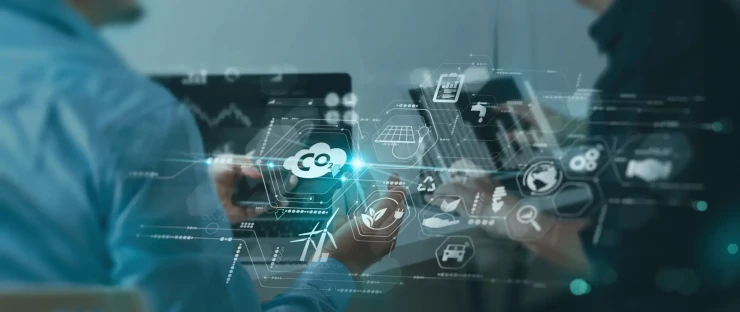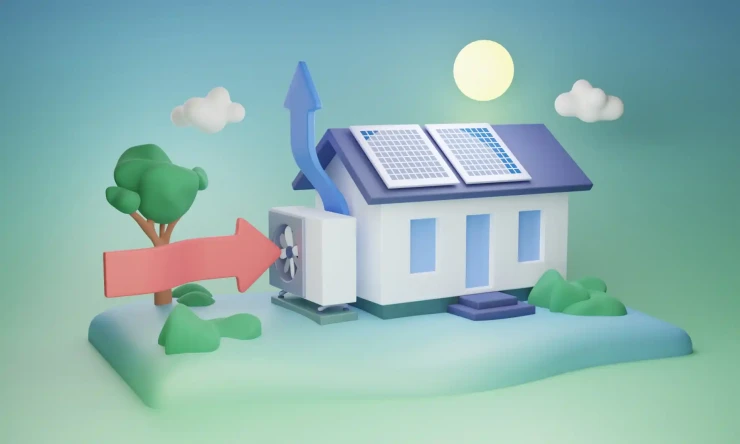More people than ever before are looking for environmentally friendly ways to power their homes. We live in an age when electricity has never been more important. We use electricity for almost everything from our home appliances and lighting fixtures to our computers, laptops, and mobiles. This large appetite for electricity makes it imperative to look at alternatives to using fossil fuels to generate the power we need.
Installing a solar array is most likely to be one of the green solutions you are considering. Solar panels use photovoltaic cells to harness the sun’s energy and convert it into electricity. You don’t have to live in California to benefit from solar power as panels can still generate some electricity on gloomy days. If solar panels are used efficiently, the average home in the UK can generate 50-60% of the power needed to supply its electricity.
The cost of installing a solar array is certain to be a concern but despite the lack of government subsidies over the past couple of years solar panels are still a fantastic and affordable investment. The economics of solar power has changed due to the steady drop in solar prices over recent years. An increase in demand and the development of new technology has led to solar panel costs falling by 50% over the past decade.
Solar panels are becoming an increasingly attractive option for homeowners because solar panels are an environmentally friendly and cost-effective solution to energy consumption in the home. They can also offer a secure return on investment and on top of that they require very little maintenance.
COMPARE PRICES FROM LOCAL INSTALLERS
Compare prices from local companies fast & free
Enter your postcode to compare quotes from leading professionals. We promise to keep your information Safe & Secure. Privacy Policy
Here are some of the reasons why you should install solar panels:
- Solar panels are currently cheap to install
Solar panel costs have dropped dramatically over the past few years. The price of a typical solar panel system installation will cost between £5,000 and £8,000 and is getting cheaper. In recent years, the price of installing panels has decreased by 70%. According to government data, installing 4kW of solar panels in the first 3 months of 2020 was already £288 cheaper, on average, than it was in 2019. It can take anywhere between 15 and 26 years to recoup your costs for a typical home depending on where you live, how much electricity you use and what you're paid under the smart export guarantee.
- You can save money on your utility bills
Solar energy is free to use, as sunlight is free! You can use the electricity your panels generate, to significantly reduce your electricity bills. How much you save will depend on your system size, electricity use and whether you are home during the day to use the energy that you’re producing. If you’re at home all day it will take less time to recoup your initial outlay on the installation, probably between 15 to 18 years depending on where you live as you will need to use less electricity from the grid. Using the power from your solar panels at the right time is key to saving money on your electricity bills. It’s a good idea to set appliances up to run while it’s light outside during the winter for example, staggering them to make the maximum savings. The Energy Saving Trust estimates that a typical 4kWp system can knock between £90/year and £240/year off your utility bill (kWp stands for kilowatt peak – how the power produced by panels is measured).
Overall, the cost of domestic solar electricity is now around 8p per kWh. This is a lot less than the 16p average domestic import cost from the grid, a cost that has increased by an average 4.75% each year over the past decade. Just taking this fact into consideration will make installing solar PV extremely worthwhile as you will be protecting yourself against future increases in the cost of importing power from the grid.
- Get paid for any excess energy you generate
Back in January 2020, the government launched a new scheme known as the Smart Export Guarantee (SEG) to pay households that install solar panels. All large energy providers in England, Scotland, and Wales with at least 150,000 customers are required to pay homeowners for the renewable electricity they export back to the grid. This is electricity you generate but don’t use yourself that is then pumped back to the National Grid for use in other homes and businesses. In order to qualify for the SEG your solar panel system must be 5MW capacity or less and both your solar PV system and installation must be MCS accredited. MCS, or the Microgeneration Certification Scheme, is a quality assurance scheme for microgeneration technologies. Technology which is MCS accredited has been installed to a high standard and will operate both safely and efficiently. You’ll also need a smart meter that’s capable of tracking how much solar electricity you’re exporting to the grid to be able to receive the SEG.
Energy suppliers offer tariffs that pay a set rate for each kilowatt (kWh) hour of energy you export. The amount you receive varies by supplier and you’re free to shop around to get the best rates. Rates currently range from just 1.5p per kWh to 11.0p per kWh. Depending on your circumstances, a 4kWp solar panel system could make around £340 per year which will go a long way to helping you recoup your original investment. The great thing about the SEG is that you no longer need to feel that your unused electricity is being wasted and SEG rates should gradually increase as energy companies compete with one another.
- Reduce your carbon emissions
Installing solar panels is a great way to reduce your carbon footprint. Solar energy is a natural, renewable source because it can be replenished unlike fossil fuels which are finite. Unlike non-renewable fossil fuels like coal and oil, solar is clean and does not produce greenhouse gases, carbon dioxide or harmful pollutants. Solar panels use only the natural renewable energy of the sun to generate electricity. The Energy Saving Trust estimates the average UK home with a solar PV system installed could reduce carbon emissions by 1.3 to 1.6 tonnes per year depending on where you live in the UK.
Using solar energy contributes to a much cleaner atmosphere. There’s no doubt that this is both good for our health and for the environment. By installing a solar panel system, you’ll be taking advantage of an eco-friendly way to make your home more energy efficient.
- Use a reliable energy source
If you install a home solar system, you will no longer have to rely on traditional power sources of electricity which can be unreliable. Non-renewable sources of energy are limited and will eventually run out. You can have peace of mind knowing that solar energy will never run out.
- Little maintenance is required
Home solar systems are easy to maintain. In fact, solar panels are very durable, and it can be several years before they require maintenance, which means less hassle for homeowners. You simply need to ensure that the surface of the solar panels is clean, and they’re not overshadowed by trees. The inverter will need replacing after 20 years which costs about £800, but solar panels will last 20+ years with little maintenance required. If your solar system has been properly installed and well-designed you shouldn’t have to worry about maintenance very much at all. There are of course things that can go wrong. Make sure your installer warranty covers you for up to 20 years.
If the panels have been damaged by something unexpected such as a storm, you may also be covered by buildings insurance. It’s worth checking what your insurance covers before you have the solar panels installed.
- You can still switch energy supplier
You don't have to get your electricity supply and smart export guarantee tariff from the same company. You can even pair solar panels with a renewable energy tariff, if you want to be fully green. Just like everyone else, solar panel users can switch tariffs freely by joining a service such as Money Saving Expert’s Cheap Energy Club.
- Planning permission should not be needed
Most of the time you will not need planning permission for solar PV systems. There are a few exceptions which include, if your property has a flat roof, is listed or in a conservation area.
You might need to get approval from your council’s building control team, so remember to check with your local authority before starting your solar project.
In England and Wales, the Government’s Planning Portal says that panels are likely to be considered as “permitted development”.
Looking at the benefits listed above I think you can safely say that home solar systems are a worthwhile investment. Despite the lack of government subsidies, as long as you use at least 50% of your solar power on site, with a sensible choice of import tariff, solar will make financial sense. The more solar energy you use on site the more you will save. It’s also worth bearing in mind that the cost of grid electricity is constantly rising. Finally, I’d like to stress the importance of making sure you find a reliable and trustworthy service provider that can provide you with a quality home solar system and handle its installation and maintenance.





























